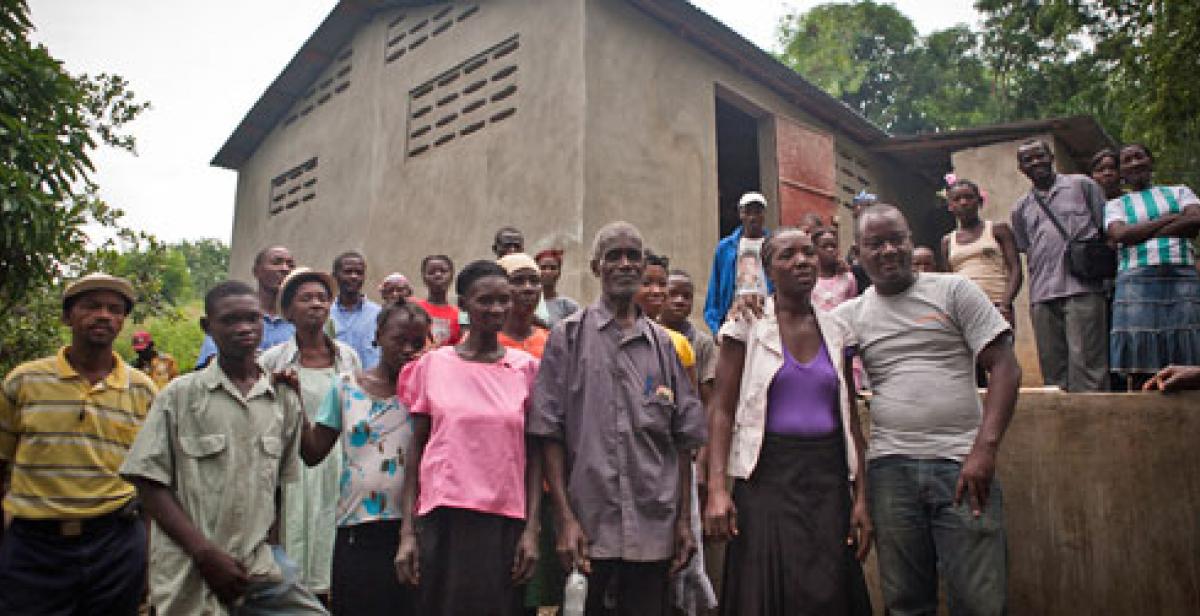The cassava factory starts producing, irrigation canals are dug, and more funds are needed to tackle child malnutrition...
DW Gabriel: "The cassava breads were a huge success"
After the delays and changes in the schedule due to the heavy rainfalls during the last weeks, we managed to finish the planned training workshop for November and December. We worked with the beneficiary groups and promoters in the transplantation of vegetable seedlings and with another group we did the training on processing of cassava.
After the workshop the trained women produced cassava bread of three different flavours and presented these during the Fair on Food Security in Ouanaminthe. The cassava breads were a huge success and the women were really proud. This was a first step to enhance the promotion and marketing of this product in order to generate income for these women.
The cassava breads have been produced under high standards of manufacturing and hygiene. This is key and we put special emphasis on this during the training as it is a precondition for succesful marketing of this product.
However, we still need to carry out the workshop on accounting, management, marketing and sales to start regular production for the market. We plan the official opening of the cassava processing factory (pictured above) and first marketing of the products in January. The trained women and the community of Gens de Nantes are really excited, it's the first community factory of this type and cassava bread is a product that is very popular.
DW Bernardo: "They are doing well and progressing rapidly"
Last week we presented monitoring reports to PROMARENA (Programme of the Ministry of Environment) and GIZ, along with requests for funds. We are still awaiting the disbursement of funds. Experience has shown us that the administrative procedures of public institutions or agencies take time, but sometimes we do not have much patience, as we have planned activities and commitments with groups beneficiaries, as well as the desire to carry out the actions...
If all goes well, next week we will have the funds and we are now coordinating how to execute these before Christmas. It is planned to purchase materials and supplies to complete the installation of some vegetable plots. We need to buy tools and seeds for home gardens and give them to the beneficiary families.
Besides that, I went with my colleague Oscar Recio [from partner organisation Solidaridad Fronteriza] to the field, tracking the work of the brigades for infiltration [irrigation] systems. They are doing well and progressing rapidly, though it's hard work to raise infiltration canals of 300m for each plot.
DW Karina: "We will not abandon these families"
Together with my colleagues Rosa Martínez and Altagracia Tapia (Gender Department of Solidaridad Fronteriza), I have visited families at risk (high degree of precariousness and food insecurity) in the most isolated areas of Cruz de Cabrera. Our promoters who have been formed under the food security project have identified in their communities families with children at risk of malnutrition. The purpose of the field trip has been the following up of these cases and to see how we could support these families.
The major limitation is the lack of resources. So far, we have no funds to continue the food security project with new or more families. But there are still so many vulnerable families which need support and could improve their situation considerably through home gardens and raising of hens.
We managed to distribute seeds that are left over from another co-funded intervention and at the same time we are presenting a proposal for a small institutional fund that could help these families. Despite the limited resources available at this moment, we will not abandon these families, it is our responsibility and families rely on our support and accompaniment.
Photo: DW Gabriel Petit-Homme (right) with villagers in Gens de Nantes outside the cassava processing factory (photo © Fran Afonso/Progressio).
Photos in slideshow by Gabriel Petit-Homme.
 Read more stories from our food security project
Read more stories from our food security project
Return to Food for a better future home page



